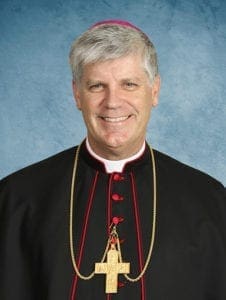That they may be one
By BISHOP BERNARD E. SHLESINGER III, Commentary | Published October 17, 2022 | En Español
Recently, I had the privilege of representing the Archdiocese of Atlanta at an event honoring the late Anglican Archbishop of Cape Town, Desmond Tutu. This tribute at the Woodruff Arts Center brought together clergy, politicians, corporate executives, educators, students and people of good will to celebrate the life and legacy of a man who was pivotal in ending the apartheid regime in South Africa.

Bishop Bernard E. Shlesinger III
Archbishop Tutu later became a Nobel Laureate because he championed human rights, racial equality and restorative justice in the work for peace. In the words of Carl Ware, retired Coca-Cola executive vice president and co-chair of the organizing committee of the tribute, I was reminded that “in a time where we are divided as a nation, this tribute brings communities of all faiths and backgrounds together in an effort to continue the legacy of Archbishop Tutu and begin our path to reconciliation.”
The legacy of Archbishop Tutu has led me to see ever more clearly how important the work of restorative justice is to the ecumenical movement. Polarization can be seen in racial injustices, economic injustices and political ideologies. It has also gone unchecked in Christianity itself, which is contrary to the model of unity Christ has set for us.
Pope St. John XXIII said that the unity of the church was the “compelling motive” for his calling the Second Vatican Council and that unity of Christians was a major concern of the Catholic Church. One of the many fruits of the Council was the decree on ecumenism, Unitatis Redintegratio (Restoration of Unity), which emphasized what is good and holy in the various Christian communities. The decree urged common prayer, dialogue and work for justice and peace.
The unity of Christians allows us to fulfill Christ’s will that “they may all be one” (Jn 17:20), and to exist in the world as the living embodiment of his peace. The promotion of restorative justice and ecumenism is a moral imperative to achieving this unity. In the words of Pope Francis: “For us as Christians, walking together is not a ploy to strengthen our own positions, but an act of obedience to the Lord and love for our world.”

The Ndlovu Youth Choir of South Africa performed song and dance at the Archbishop Desmond Tutu tribute in Atlanta Sept. 28. Photo by Curtis McDowell Professional Photography
The Archbishop Tutu tribute brought home to me the pressing need for all of us to play an active part in building up the body of Christ and healing all those who are wounded or feel separated from us. In sports, some say that “winning is the only thing,” but winning is not the ultimate goal when conflict arises in marriages, families, nations or among Christian Churches.
In the midst of addressing conflict and injustice, we must also remember that there still remains the vital tasks of healing wounds and continuing to walk together toward an ever greater unity in the Body of Christ—a unity that gives to the world a vision of peace and justice in its fullest sense. This is the work of the Holy Spirit, who lives and moves in the hearts of true believers like Archbishop Desmond Tutu.